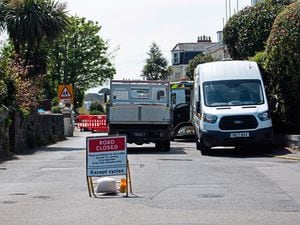Members reject move to include income tax hike among options
Income tax will stay at 20% in Guernsey regardless of whether States members approve a goods and services tax during this week’s Funding and Investment Plan debate.

Members spent the first two hours of yesterday’s morning session continuing their consideration of whether to add a proposal to raise the basic rate of tax to 22% from January and 23% from the following year to the list of options they will vote upon at the conclusion of debate.
The move was led by former chief minister Lyndon Trott and seconded by father of the House Deputy John Gollop.
After strong criticism from several senior members, it was defeated by 30 votes to 10.
Environment & Infrastructure president Deputy Lindsay de Sausmarez did not want to see the item on the menu, as she said it would exacerbate the very problem which the tax review was intended to solve – the looming demographic challenge of the changing dependency ratio.
Hear more from Deputy Trott on our daily 'Shorthand States' podcast, with Simon De La Rue and Matt Fallaize
Extracting an even greater share of the total tax take from income-earners, when their number was expected to shrink, would be unsustainable, she said, and would lead to the income tax rate having to be increased even further in future to bring in the same sum.
It would be a worse result than agreeing nothing, she said.
Policy & Resources member Deputy Dave Mahoney said he was ‘staggered and depressed’ that the debate was being had at all. Most islanders were probably not even aware that such a significant move was being considered, he said. As a result, there had been no time for feedback, consultation and ‘no time for banners and flags to be made up’.
‘This has been slipped in under the radar,’ he said. ‘Listening to this debate so far, the business community will be scared witless at some of the comments that have been made.’
A rise in income tax would fail to extract any further monies from those hitting the tax cap or people living off capital, and would hit the less well-off far worse than P&R’s own, more progressive, GST-based tax solution.
It would also make Guernsey less competitive as a jurisdiction, he said.
‘This will make us a laughing stock as a government, and that laughing will be led mostly by Jersey,’ he said.
P&R treasury lead Deputy Mark Helyar claimed the finance industry’s continued presence in the island was dependent on a fiscal stability which would be fatally undermined by a sudden 3% hike in the tax rate.
Responding to criticism that P&R should have included an income tax option in their own proposals, he said the committee had been unable to do so, as the parameters for their review, which had been set in the previous States term, included widening the tax base – something income tax rises could not achieve.
The 20% rate had been in place since 1961, Deputy John Dyke said, and suddenly dropping that policy would be ‘quite a big thing to do’.
‘People are listening and will be worried,’ he warned, ‘and our competitors will be licking their lips.’
Deputy Victoria Oliver described the amendment as containing ‘the first proposals that make GST look quite favourable’.
Among those supporting consideration of an income tax rise was Deputy Simon Fairclough, who urged members not to focus on remaining ‘in lockstep’ with other Crown Dependencies, but instead consider Guernsey’s own unique selling points, including the absence of a GST.
‘The last time I looked out of the window, I saw the best-looking town and harbour anywhere,’ he said.
‘This isn’t Douglas or St Helier – it’s St Peter Port. This is Guernsey, and we should be celebrating and marketing our differences.’
The amendment was merely a case of ‘two of our most experienced politicians offering us another option’, he said.
Deputy Chris Le Tissier spoke about pensioners living hand-to-mouth and argued an income tax rise would not hit their pockets in the way a GST would.
Deputy Steve Falla had a similar view.
‘We need to listen to the people and the people don’t want GST,’ he said, and though undecided on tax rises, he wanted the option to be available if no other revenue-raising measures were approved.
Similarly, Deputy Aidan Matthews said the amendment ‘gets us off a burning platform’, while Deputy Simon Vermeulen said it represented ‘the lesser of two evils’.
Responding to debate, Deputy Trott reminded members that Guernsey took 21.5% of GDP in tax compared to 26% in Jersey and 39% in the UK and that a 23% income tax rate would still leave the island lower.
‘If we walk away with nothing on the revenue side today, we will look like, collectively, a bunch of Charlies,’ he said.





